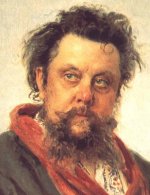|
Xtend
 Listen
Listen
 Period
Period
 Country
Country
 Notes
Notes
 Quotation
Quotation
 Projects
Projects
 Dictionary
Dictionary
 Finders
Finders
|
Born: 21 March
1839, Karevo, Russia
Died: 28 March 1881, St. Peterburg,
Russia
 Mussorgsky,
Modest Mussorgsky,
Modest
A descendant of an aristocrat family, who left a promising
military career for the sake of music. For a living, he worked as a government
clerk. A national composer who tended to seek his
inspiration in Russian folk songs, he was a member of the "Mighty
Handful" ,
a group of composers who wrote Russian ,
a group of composers who wrote Russian national music (as part of the national music trend in the 19th century),
grouped under the influence of Balakirev.
Mussorgski studied the scales
national music (as part of the national music trend in the 19th century),
grouped under the influence of Balakirev.
Mussorgski studied the scales and modes
and modes of Russian folk songs and Russian Orthodox Church melodies, and made extensive
use of them. He is rightfully considered among the
most important and original artists of Russian national music.
of Russian folk songs and Russian Orthodox Church melodies, and made extensive
use of them. He is rightfully considered among the
most important and original artists of Russian national music.
His works, such as the opera "Boris Gudonov", based on Pushkin's
drama, were rearranged after his death by Rimsky-Korsakov
"Boris Gudonov", based on Pushkin's
drama, were rearranged after his death by Rimsky-Korsakov ,
but it is widely-accepted, that his style was ahead
of his own era. Nowadays, his works are performed in original versions. ,
but it is widely-accepted, that his style was ahead
of his own era. Nowadays, his works are performed in original versions.
As a Romantic composer, he wrote a lot of programme music
composer, he wrote a lot of programme music and symphonic poems
and symphonic poems like "Night on the Bare Mountain",
arranged by Rimsky-Korsakov, and his most famous piece "Pictures
at an Exhibition"
like "Night on the Bare Mountain",
arranged by Rimsky-Korsakov, and his most famous piece "Pictures
at an Exhibition"    written for the piano
written for the piano but orchestrated
but orchestrated by Ravel
by Ravel . .
He was sickly and addicted to alcohol,
and died at the age of 42, leaving many of his works uncompleted.


Mussorgsky on the WWW
 Sites
Sites
|
 Audio
Audio
|
 Video
Video
|
 Images
Images
|
 MIDI
MIDI
|
|
Description
He was a
civil servant
He played

He Lived in the
 Romantic period
Romantic period
In
 Russia
Russia
|